Perhaps everyone else has known this since forever, but I just found out yesterday: in Google Maps you can enter the name of a KML file in the search box and it will be displayed on a map. It’s how I display a map of plazes poetry contributors.
Pull random words from the Plazes geopresence flow and you get plazes poetry. A new poem every five minutes, with unknowing collaborators from around the world.
It was a lot of fun creating this. It’s the sort of thing, I suppose, that contemporary psychogeographers should do in their spare time.
If you want to insert the latest poem into your own website, just following the instructions at [[Plazes Poetry Widget]].
You have probably thought to yourself “if I am riding my horse, and it starts to rain, what should I do.” Fortunately you have the Internet to tell you that:
If you’re out riding and you and your horse are caught in a sudden downpour, it is very important that that you and your horse get back to the barn safely. Riding through bad weather is dangerous, scary for your horse, nerve-racking, and sometimes life-threatening.
Later on in the same article you will learn that:
If you are riding with other horses in the rain, never close your eyes, no matter how hard the rain is. The instant you ingnore your riding, a disaster will occur.
I know this because there is also a song, on the Sidsel Endresen album So I Write called Horses in the Rain (regular readers will remember Sidsel from yesterday). Lateral surfing takes you to some interesting places.
Like this Randy Newman album, his self-titled first album from 1968. The 10th track on that album is I Think it’s Going to Rain Today. Take a moment and listen to some clips of the songs on the album; Newman was only 25 when he released that album, and even today it seems thorough original and inventive.
I Think it’s Going to Rain Today was covered by the selfsame Sidsel Endresen on the 1999 album Nightsong with Norwegian jazzman Bugge Wesseltoft.
Their version is the only one of the many covers by artists from Judy Collins to UB40 that bests the classic version of the song — the one you probably know — by Bette Midler from the 1988 movie Beaches (watch a clip here).
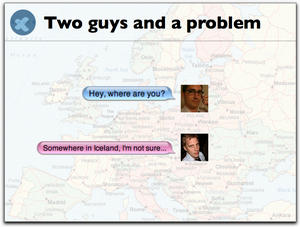 I got in my Jetta to drive to Sackville on Tuesday afternoon. And the heater wouldn’t work. I poked and prodded and looked under “heater stops working” in the manual. But all to no avail.
I got in my Jetta to drive to Sackville on Tuesday afternoon. And the heater wouldn’t work. I poked and prodded and looked under “heater stops working” in the manual. But all to no avail.
Oddly, the only other time this has happened to my Jetta, five years ago, I was also heading off to New Brunswick. Which makes me think my car shares some of my misgivings about our province to the west.
As then, however, a little bit of time to warm up, along with a jiggle to the fuse, got me defrosted and on my way.
Although I once thought nothing of driving long distances, in recent years I’ve settled down comfortably into a 3-block-radius routine punctuated by large gallomphs to other continents. So driving to Sackville felt a lot like driving to Osaka. As it turned out, however, the weather was fine, that afternoon’s episode of Q was interesting, and I made it there in 90 minutes without additional incident.
At the appointed hour I met up with Shauna at the Bridge Street Café and she guided me over to Hart Hall at nearby Mount Allison University where I could set up for my rumination on psychogeography for her protracted symposium.
Universities have changed a lot in the 23 years since I was a student in one. Although it makes me feel like Andy Rooney to say so, in my day there were no laptop computers, and if you wanted to check your email you booked a workstation in the computer lab. Now everyone has a laptop, and they are the papyrus of modern academia (you see what feats of metaphor being on a campus forces me into?).
Shauna’s geonauts listened patiently as I rambled on about the history of the Plazes idea and what it’s become (here’s a PDF of my slides, albeit without the exciting audio inserts of Felix and Stefan). There was a good collection of questions when I was done (interestingly the “aren’t you concerned about your privacy” question didn’t come up at all) and by 8:00 p.m. I was back in my Jetta and on my way back across to PEI.
Kathleen Hall Jamieson from the Annenberg School for Communication at the University of Pennsylvania is a regular guest on Bill Moyers Journal on PBS. I discovered her by accident, and have made a point of seeking her out ever since: she has a sort of insight into the process of electing a US President that is absent from almost every other venue.
Her brilliance lies in her rejection of the usual sports play-by-play metaphors in discussing the process; rather she parses the language and the positions and the spin of the candidates to get at a deeper level of what’s going on.
Here’s a video of a recent appearance where Moyers and Jamieson discuss the aftermath of Super Tuesday.
Jamieson is also involved with the excellent FactCheck.org website, “a nonpartisan, nonprofit, ‘consumer advocate’ for voters that aims to reduce the level of deception and confusion in U.S. politics.”
Here are the nominees for Best Picture at this year’s Oscars:
- Atonement
- Juno
- Michael Clayton
- No Country for Old Men
- There Will be Blood
If you have seen any of these movies, please tell us where and under what circumstances. For example, for me it’s:
- Atonement - British Airways flight from London to Boston, January 2008, tiny 8 inch seat-back video screen.
- Michael Clayton - Empire Theatres Studio 8 in Charlottetown, December 2007, the hated “Theatre 8” down at the end of the hallway, the one with the old seats and the tiny screen.
You can leave yours in the comments.
 On my car trip home from Sackville, NB last night I listened to Radio-Canada’s excellent jazz program hosted by André Vigeant. One of the songs they played last night was a Sidsel Endresen interpretation of the Police song Shadows in the Rain, from the Christof Lauer & Jens Thomas album Shadows in the Rain: The Sting Project. It took a little detective work to find this out — the playlist tool on the SRC website didn’t have last nights show available, so I worked through the artist list on the show website.
On my car trip home from Sackville, NB last night I listened to Radio-Canada’s excellent jazz program hosted by André Vigeant. One of the songs they played last night was a Sidsel Endresen interpretation of the Police song Shadows in the Rain, from the Christof Lauer & Jens Thomas album Shadows in the Rain: The Sting Project. It took a little detective work to find this out — the playlist tool on the SRC website didn’t have last nights show available, so I worked through the artist list on the show website.
You can listen to a clip of the song here (and a clip of the original Police version here).
Sidsel Endresen is a Norweigan jazz singer with a fantastic voice. If you’d like to hear her in person, you can catch her on May 23, 2008 at the Panorama in Eidsvoll. The Jazzland Recordings website has a lot more information on her other recordings.
Remember the office tower proposed for just up the street from my office? Well using the plans provided by the developer to the City, and making some educated guesses to fill in the gaps, I was able to use Google SketchUp to create a 3D model of the proposed building:
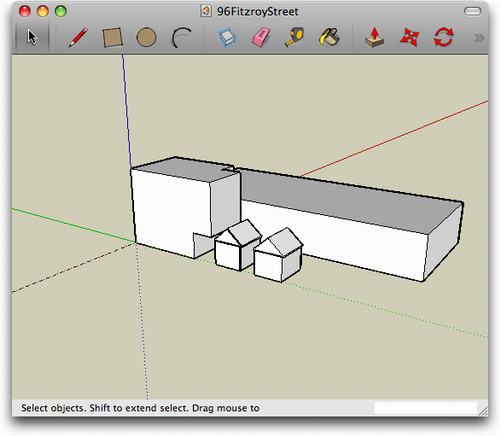
You can download my model (and improve on it, I hope). Google SketchUp is a free download and is available for the Mac and the PC. It occurs to me that this sort of 3D modeling should be required from developers for all variance applications.
 Let’s all take a moment today to pay homage to Tom Regan, who, back in the early 1990s, took the Halifax Daily News online, making it the the first newspaper in Canada available on the “information superhighway.”
Let’s all take a moment today to pay homage to Tom Regan, who, back in the early 1990s, took the Halifax Daily News online, making it the the first newspaper in Canada available on the “information superhighway.”
Tom moved on to the Christian Science Monitor and then to National Public Radio where he is the author of The NPR News Blog.
The Daily News shut down today, replacing itself with the same kind of generic “free daily” you’ll find across Canada and around the world.
The Internet Archive has the Halifax Daily News website as it was in 1997 safely stored away so we won’t forget that it was, in its time, a pioneer.
The City of Charlottetown sent along a letter to our landlords here at the office about a proposed development that’s slated for the empty lot two doors up Fitzroy Street:
The City of Charlottetown has received an application in accordance with Section 4.29, Other Variances, for a variance to the property located at 96-100 Fitzroy Street (PTD #’s 344085, 344101 & 344093) which is zoned Downtown Mixed User (DMU), to allow an increase in height from 39.4 feet (12.0 metres) as required by the Zoning and Development Bylaw, to 98s feet (29.8 metres). The pupose of the variance is to permit the construction of a seven story office building. The proposed height of the building from grade to rooftop is eighty five (85) feet. The proposed height of the building from grade to the top of the mechanical penthouse is 98 feet. The proposed building will also be constructed to the property line or zero (0) setback. The attached map shows the location of the proposed structure on the property. In regards to parking the developer is proposing off lot parking or cash-in-lieu or a combination of these options as determined by Council.
As a property owner within 100 meters of this application, you are being notified of the requested variance. The City solicits your comments with respect to the proposed variance. If there are any objection(s) we would appreciate receiving the reasons for the objection(s) within fourteen (14) calendar days of the date of this letter. In accordance with Section 4.29 the City Planning Board will consider this application at its next regular meeting and may then recommend to Council to grant or deny this variance. Written comments on this application should be submitted no later than 12:00 noon on February 19, 2008.
If you have any questions in regards to this proposed variance, please contact the Planning Department at 629-4158.

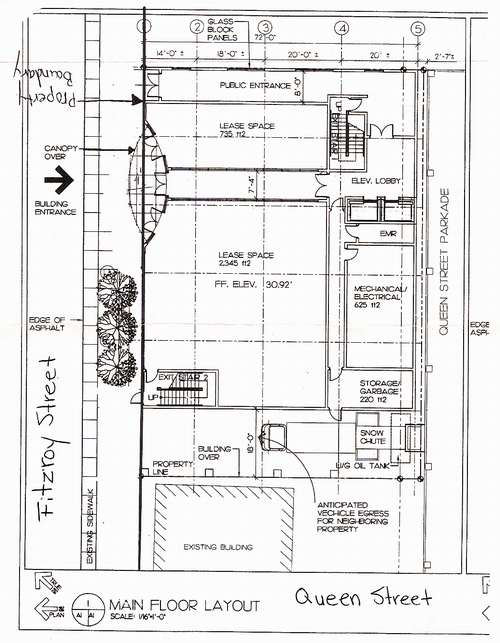
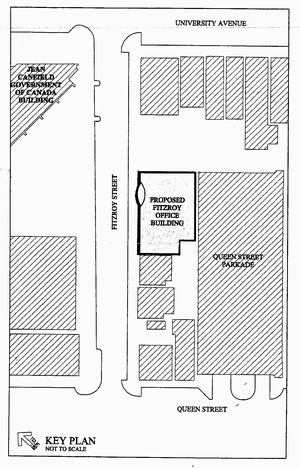
The lot in question has been empty for the past few years; formerly it was occupied by a rather dilapidated building which was torn down. In recent years the lot was used as a parking lot for construction workers building the Jean Canfield Building across the street, and last fall the parking lot was closed and an 8 foot high plywood fence was built around 3/4 of the lot. This is what it looks like this morning:
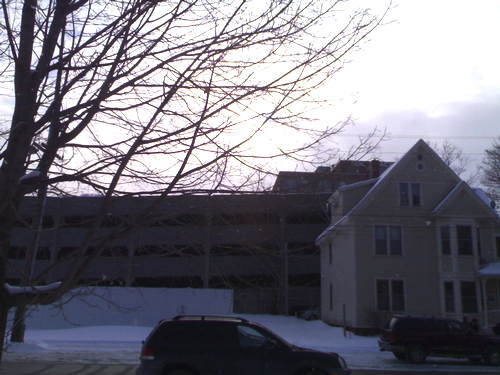
 I am
I am